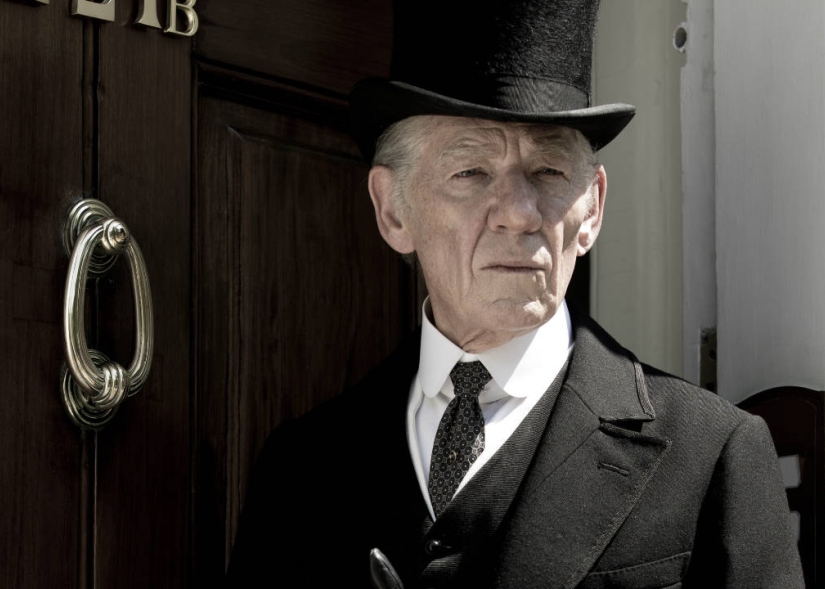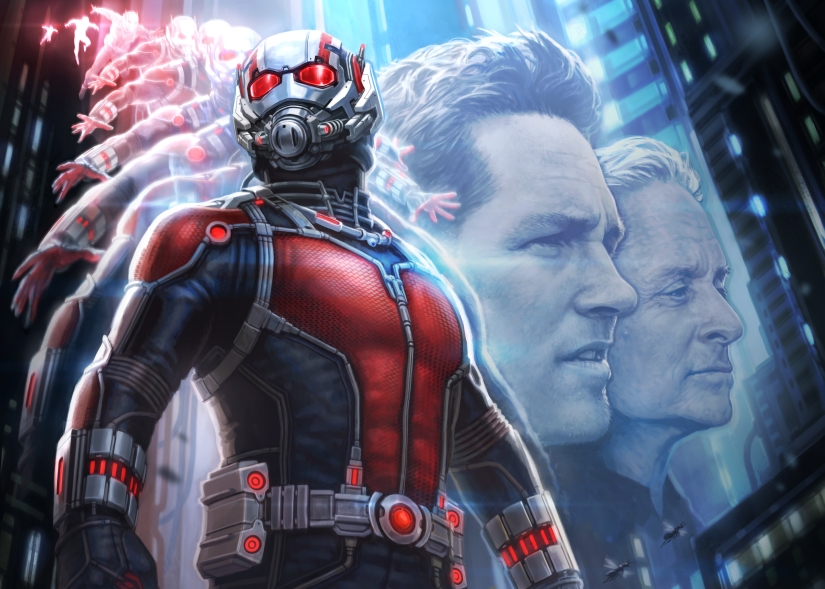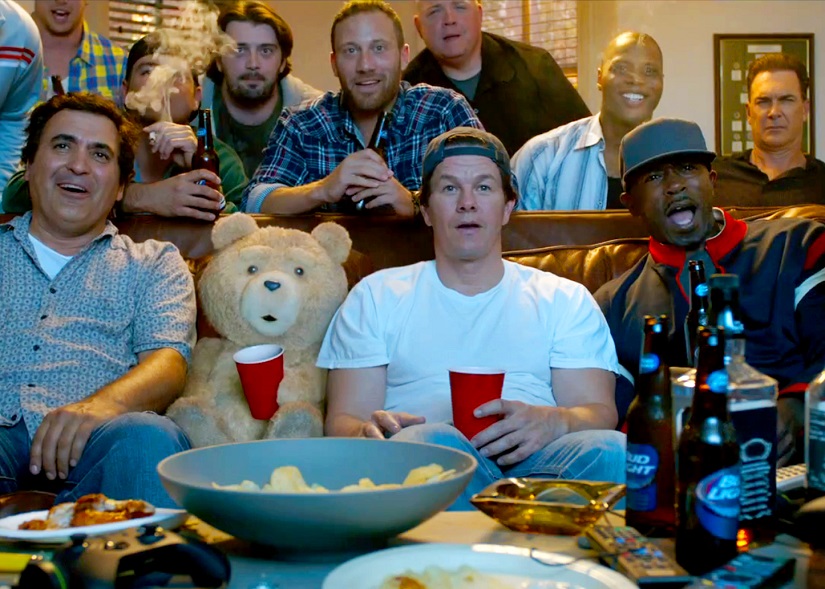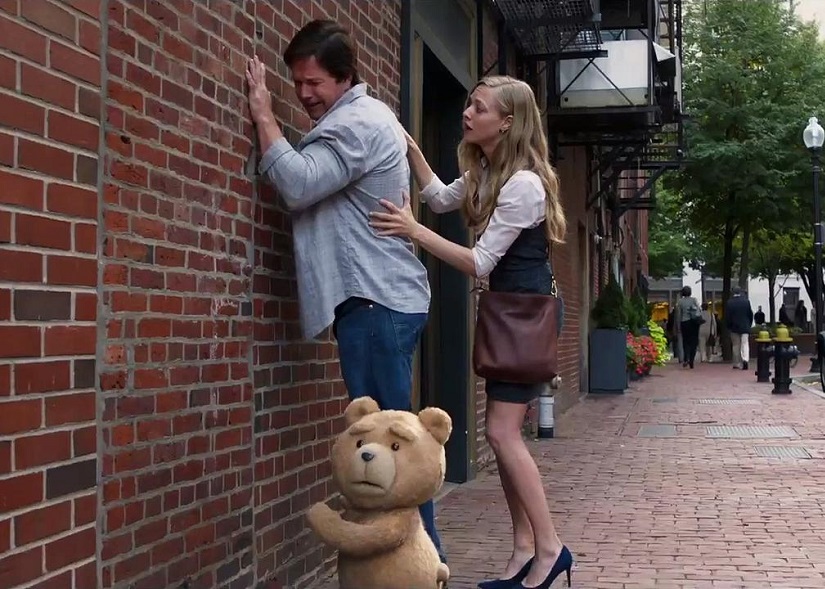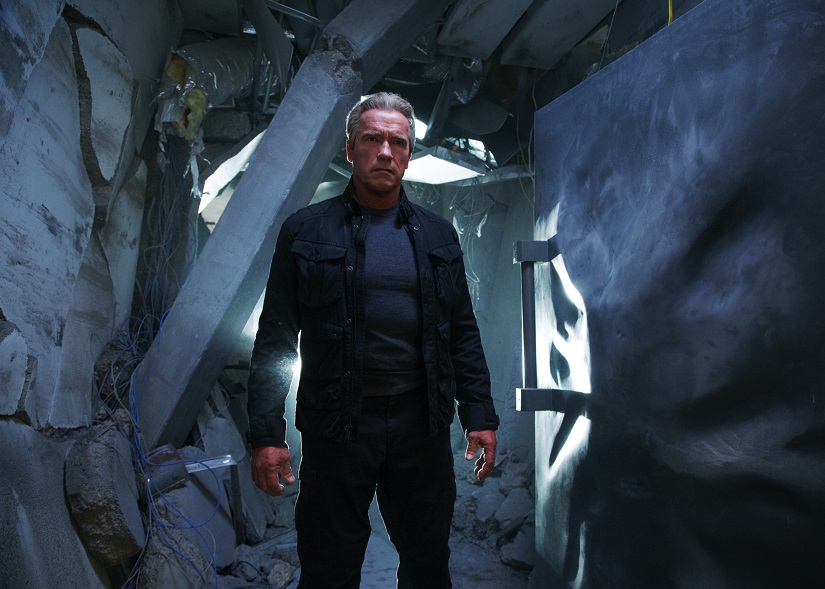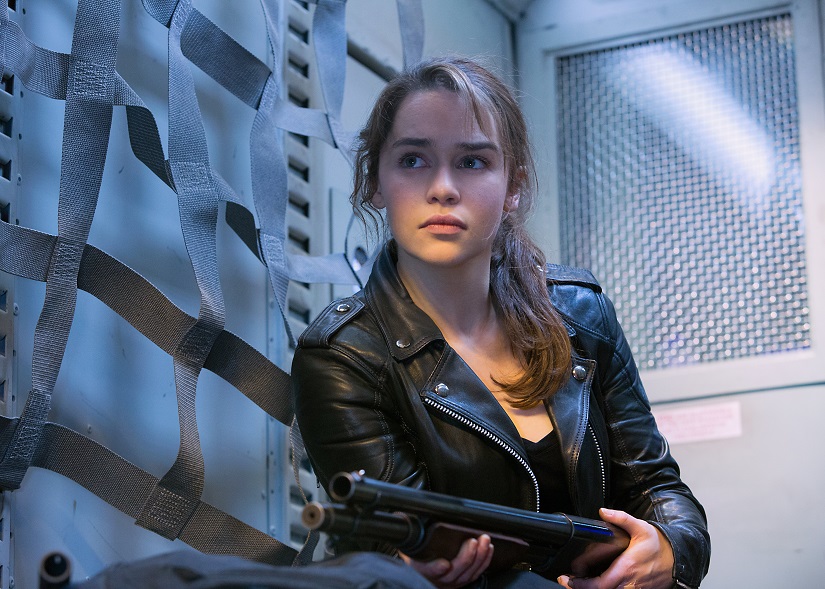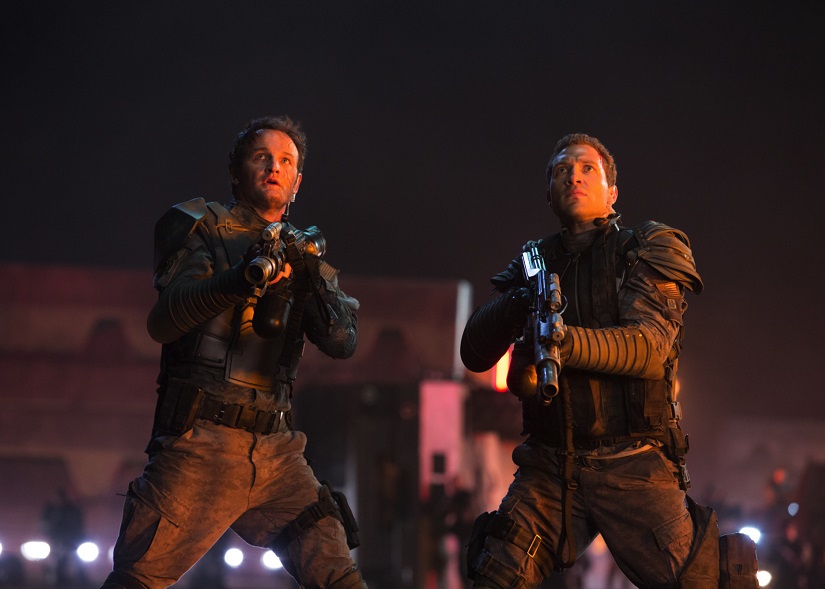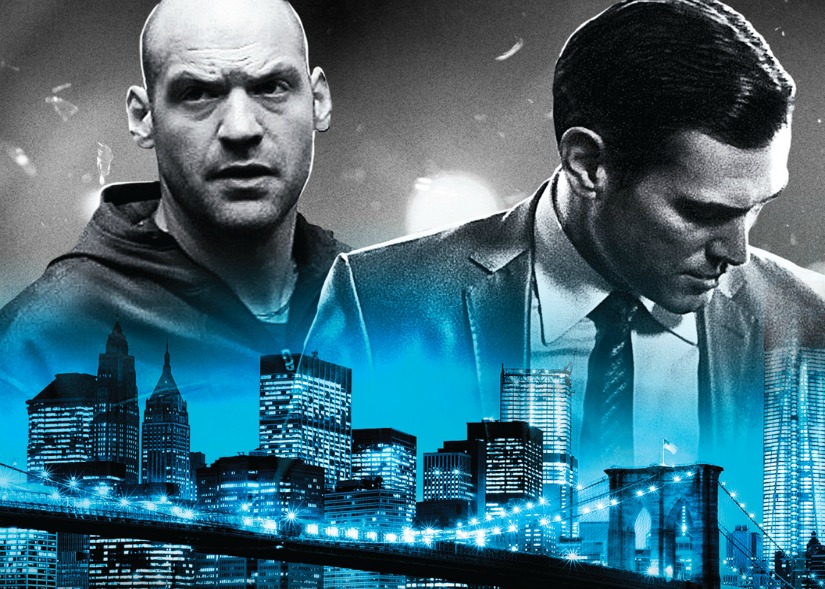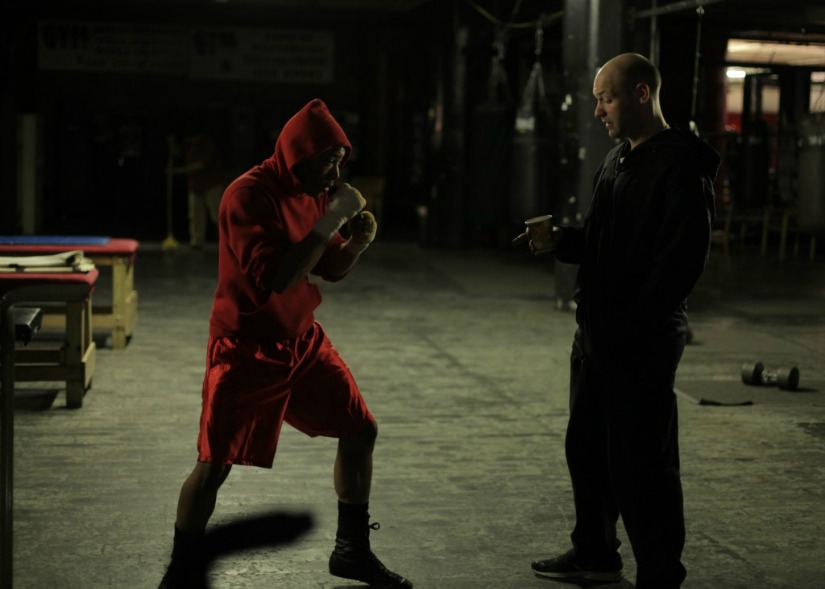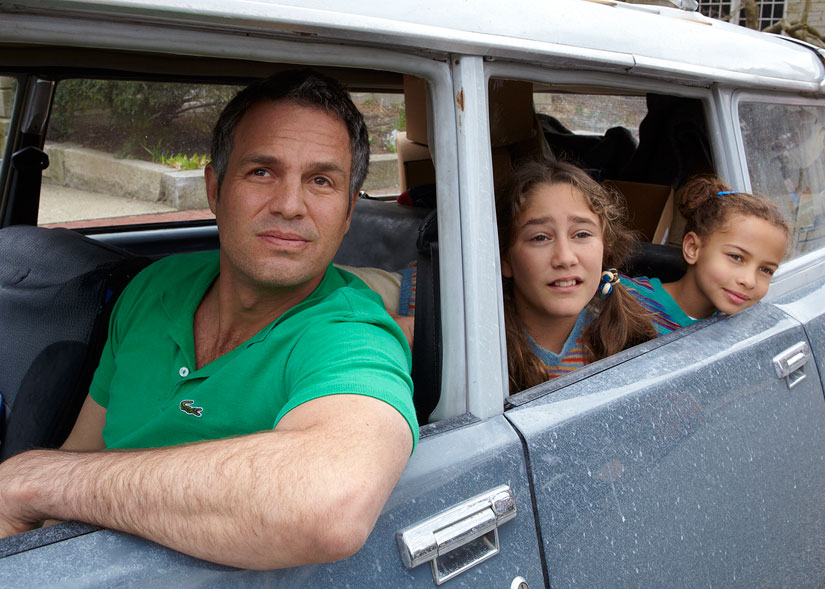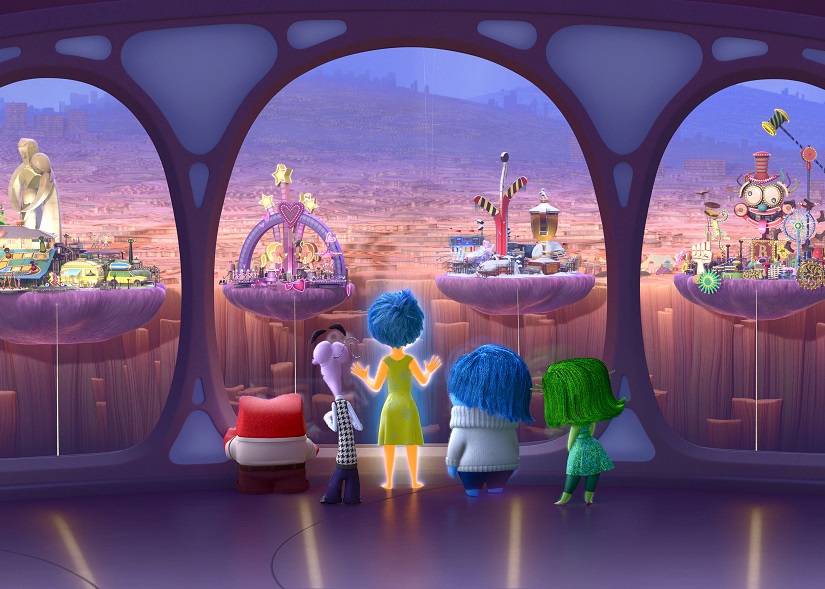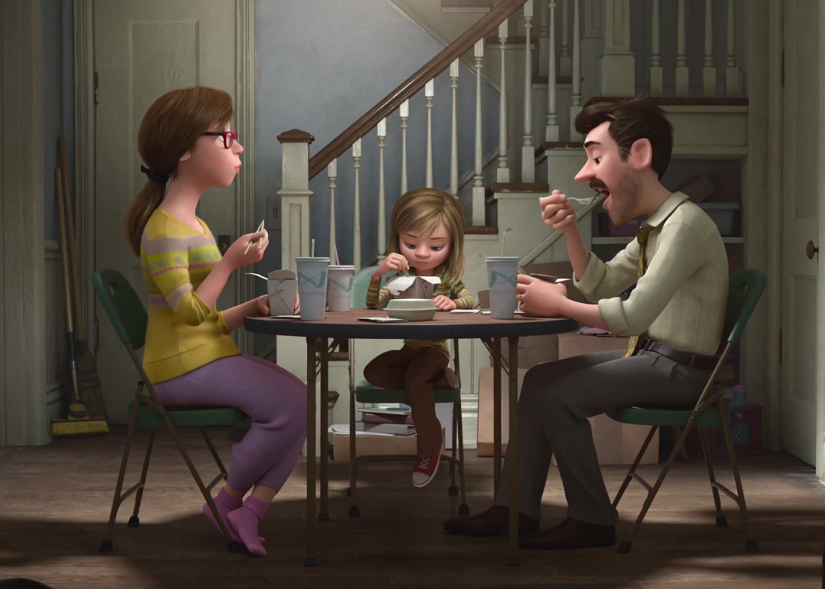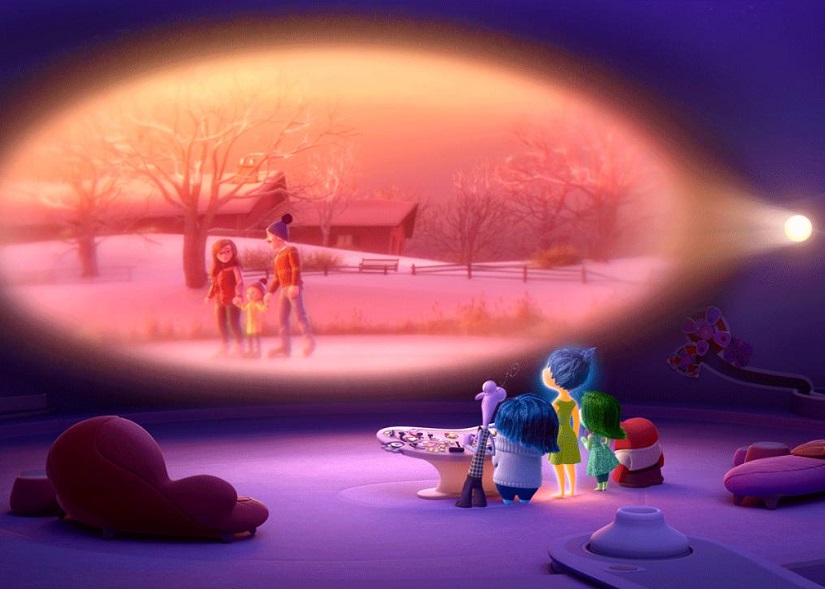[Review] Mr. Holmes
Detective characters are often stand-ins for writers, and sometimes vice versa. The work of solving a mystery, like writing a tricky story, involves putting disparate pieces together into some form that logically holds together and seems true, no matter how improbable. Adapted from the novel A Slight Trick of the Mind by Mitch Cullin, Mr. Holmes puts the world's greatest detective in the role of a writer. Elderly and with a flagging memory, Sherlock Holmes tries to unravel the mystery of his final case and why it forced him into retirement on a Sussex farm where he tends to bees.
The idea of an aged Sherlock Holmes trying to unravel the mystery of his own memory is a fascinating set-up, especially given how elusive and illusory our memories can become as we get older. Mr. Holmes re-teams director Bill Condon and star Ian McKellan, whose careers both received a major boost in 1998 thanks to the film Gods and Monsters. The always-good Laura Linney is also in the film as Mrs. Munro, Sherlock's maid and caretaker.
However, even with all that promise, there's something about Mr. Holmes that seems so elementary.
[youtube id="WhPPq9cmPCc"]
Mr. Holmes
Director: Bill Condon
Rating: PG
Release Date: July 17, 2015
In Mr. Holmes, both Sherlock Holmes and John Watson were real people. They solved actual cases reported in the news, and Watson wrote them down as popular novels to be sold to the public. The sleuths were celebrities, and at the start of the film, a woman who sees the retired detective in passing seems starstruck. She asks no one in particular if that man going by is the real Sherlock Holmes. Sherlock is annoyed by the notoriety since not everything in the books was true. The deerstalker cap, the calabash pipe--pure invention. But by writing about the last case, Sherlock wants to set the record straight, at least for himself.
That case that triggered Sherlock's lapse in memory was a case he did without Watson present. It involved a woman who seemed demonically possessed to play a glass harmonica. We get snippets of the case throughout Mr. Holmes, which intercuts the past being written/remembered, the present in post-WWII Sussex, and a flashback to a recent trip to Japan. In the present day, the curmudgeonly Sherlock tends to his beehives while widowed Mrs. Munro looks on downtrodden. Her son Roger (Milo Parker) is a Sherlock Holmes fanboy and idolizes the detective and his shtick. While in Japan, Sherlock's mind is so addled by age and regret that he needs to write his host's name on his shirt cuff just to address the man during dinner.
There's a line by the writer Clive Barker (an executive producer on Gods and Monsters) that seems apt here: "I write to remember, and I also write to forget." We jot things down so we'll remember them for later or to coax recollection, but we also write things down so we can finally forget about them, sort of like deleting files. In Mr. Holmes, the process of writing is about forcing out memories and being able to let the memories go. Here the Barker line is lent a sense of absolution. By solving his own human mystery through the process of writing, the detective may be able to die in peace.
The big issue isn't the elements of Mr. Holmes but rather how sloppily the elements come together. The three different threads of the story don't braid nicely. Rather than complementing and enhancing one another, they intersect and interrupt and then just run semi-parallel. I felt like they were each their own discrete Elderly Sherlock Holmes adventures, though ones that happen to be faintly contingent upon one another--the difference between "stuff that happened" and "story."
The sections of the film that deal with Mrs. Munro and Roger are warm and well-acted, but almost too sweetly so, and its class drama seems only half-explored. The Japanese segment seems dashed off at times, its significance, even when revealed, a trifle in the conscience of the detective. The primary interest is the remembrance of Holmes' final case, but even that winds up dissatisfying. The solution is too convenient, as if the final piece of the puzzle falls into Holmes' mind without the effort of the conscious mind. It's a lazy cop out that lacks the surprise or sense of invention that's found in the better stories of Arthur Conan Doyle.
McKellan at least shines, and he keeps Mr. Holmes watchable even when the script treads water. He portrays Sherlock a cold and quick in his final glory days, dashing too. In Japan, McKellan plays the detective as haunted but still trying to pass as his old self. As much as he hates the pop culture idea of himself, he's trying to play the part for his host. It's in the present, in the thick of his case of memory, where Holmes is the most human and vulnerable. He dodders like an old man at moments, and he weeps for his lack of wits. He's no longer himself, and he can't figure out why. What a dreadful mystery for any detective, and what a horrible block for someone writing a memoir.
[Review] Ant-Man
There was a concern that Ant-Man would lack personality. Edgar Wright (Scott Pilgrim vs. the World) had spent ages developing the Ant-Man screenplay, but he left the project due to creative differences with Marvel Studios. Peyton Reed replaced Wright as director and the screenplay was retooled by Adam McKay (Anchorman) and star Paul Rudd. Ant-Man wrapped principle photography in December 2014 to meet its July 2015 release date.
Shockingly, Ant-Man is good in spite of the changing hands and the accelerated turnaround from production to release. In fact, the film is chock full of giddy creativity that's lacking in other blockbusters. There's solid action throughout, but there's a healthy dose of self-effacement and self-deprecation, as if everyone involved acknowledges that you're watching a movie about Ant-Man, of all people.
While there's something to be said about my initial low expectations, Ant-Man succeeds primarily because it's allowed to be its own little, lighthearted animal in the big, bloated Marvel Cinematic Universe.
[youtube id="pWdKf3MneyI"]
Ant-Man
Director: Peyton Reed
Rating: PG-13
Release Date: July 17, 2015
Scott Lang (Rudd) is an ex-con who gets back into cat-burgling when he can't make ends meet in civilian jobs. Thanks to his MacGyver-like cunning in a nicely crafted heist sequence, he steals a super suit that belongs to scientist Hank Pym (Michael Douglas). The suit allowed Dr. Pym to shrink down to insect size and carry out covert military operations for the U.S. Government. Scott teams up with Pym and Pym's daughter Hope (Evangeline Lilly) in order to stop Darren Cross (Corey Stoll), a protege of Pym's who wants to use similar shrinking technology to create an army of miniature soldiers for the highest bidder.
Even though Ant-Man is a origin story, it never feels bogged down in set-up like many other origin stories. Pym passes his heroic legacy on to Scott, which makes it feel like we've hopped into the middle of a larger story rather than the cold start of a new one. The brisk, comic pace conveys Scott's transition from sarcastic doofus to unwitting-hero to reluctant-hero to superhero. A key training sequence mid-film is full of recurring gags and variations on recurring gags, each one offering a sense of character development and progression. Like a competent kung-fu film from the 1970s, we watch someone with talent but no discipline refine themselves under the tutelage of a master. There's clunkiness in the way Ant-Man deals with father-daughter and surrogate-father-son relationships, however, which is the foundation for many of the character interactions. It's serviceable and occasionally saccharine, though the father-child theme at least yields a few genuine moments of unexpected emotion.
When Scott learns what Cross could do with shrinking technology, he says that they should call The Avengers. Pym sneers that all the Avengers do is drop cities from the sky, which seems to define the contrast in Ant-Man's approach to action. The movie can't possibly outdo The Avengers in terms of the scope, so Ant-Man instead relies on the humor of its small stature. They can't drop cities from the sky, but they can blow up a scale model to simulate citywide destruction; ditto the derailment of a Thomas the Tank Engine train set. Seeing Scott grab the grooves of an EDM record on a turntable or run alongside a colony of ants recalls both The Incredible Shrinking Man and Honey, I Shrunk the Kids, each of which found a kind of imaginative awe in the miniature world. It's mostly unfamiliar territory for modern blockbusters, almost all of which every weekend depict the total destruction of major cities and the deaths of thousands. You see one metropolitan city get completely decimated, you've seen 'em all. Ant-Man is refreshing by comparison.
Rudd's a charming scoundrel with a heart of gold, and he carries the lead role with some fine wisecracks and slacker charisma. Douglas gets to do the old-dude-deadpan routine, and also plays concerned father to Hope and disappointed father-figure to Cross. On the note of Hope, she's saddled with the trope of the icy careerist, but there's enough in the writing (apparently added during the rewrite phase) and in Lilly's performance that makes her a bit more human. Scott's supporting thieves add personality when on the screen, particularly Luis played by Michael Peña, whose comic timing and delivery propel some of my favorite non-action sequences in the film.
There's something I've noticed as Phase Two of the Marvel Cinematic Universe draws to a close. The standouts for me have been the films that got away from straight-up superheroics. Even though Avengers: Age of Ultron did great at the box office, the movie was a generic rehash of the first Avengers. By contrast, Captain America: The Winter Soldier added the paranoia of political thrillers from the 1970s, and Guardians of the Galaxy was an '80s misfit movie (i.e., The Goonies in space). Since the Marvel Cinematic Universe is driven by producers/Marvel Studios rather than by directors/screenwriters, mixing a different tone or genre into the superheroics seems like a form of creative triangulation. To put it another way, hybridty and genre cross-pollination is the best way for a Marvel film to develop its own identity given the way that they're made.
In that regard, Ant-Man belongs in that standout class from Phase Two. The film sticks to its lighthearted tone and blends the madcap imagination of '50s and '60s sci-fi films with the meticulous, ticking-clock operations of a cinematic caper. Ant-Man's a movie with its own sense of character even though it isn't driven by a directorial voice or vision. The filmmakers of Marvel's Phase Three can learn something useful from the little guy.
[Review] Ted 2
Despite having little affection for either the comedy stylings of Seth Macfarlane or the acting career in general of Mark Wahlberg, I ended up being quite fond of Ted. Macfarlane's propensity towards hollow shock value, vulgarity and incessant, context-free pop culture references were softened by the need to develop actual characters in telling a story across a feature-length period of time (not that he paid much heed in his subsequent, abysmal directorial follow-up, A Million Ways To Die In The West) and Wahlberg's willingness to send up his tough guy image whilst playing opposite a foul-mouthed teddy made an instantly charming partnership.
The good news is that Ted 2 offers more of the same. Wahlberg is on stupendous form and his riffing with Macfarlane's Ted continues to be a seemingly inexhaustible source of laughs. On the downside, as was the case for Pitch Perfect 2, more of the same and nothing more feels decidedly underwhelming in the wake of an unexpectedly strong first outing. Ted 2 isn't short of terrific sight gags and humour at once utterly filthy and delightfully childish, but lacks the spark of joy and surprise which, like the eponymous bear, elevated the original to something greater than its component parts.
[youtube id="S3AVcCggRnU"]
Ted 2
Director: Seth Macfarlane
Rating: R
Release Date: June 26th, 2015
At the centre of the plot is a civil rights allegory in which Ted, wishing to conceive a child with his new wife, Tami-Lyn, discovers that the State does not legally consider him a person and has revoked all his rights. With the help of an aspiring lawyer (Amanda Seyfried), whose lack of pop cultural knowledge is more than made up for by an avid enthusiasm for weed, he and John travel to the Supreme Court to get the ruling overturned. Despite being atrociously argued every step of the way, there's no doubting the sincerity of the movie's attempt to raise pertinent and serious social issues, but in doing so, the movie is starkly divided between the relatively seriously handled courtroom scenes and the juvenile silliness piling up elsewhere. It's a credibly ambitious plot for an otherwise by-the-numbers sequel, but gracelessly handled in a way which drags the movie down whenever it comes up in any meaningful capacity.
Seyfried also struggles to find her place or find any life for a character who never adds up as a credible human being. While there's no reason an aspiring lawyer couldn't imbibe copious quantities of drugs in her downtime, from a dick-shaped bong no less, she shares a similar problem to the courtroom scenes in that she seems a completely different person when we're expected to respect her competence in a professional capacity. Macfarlane also puts her at the centre of a number of mean-spirited jabs directed at Lori, John's romantic interest in the previous movie and now ex-wife. Lori was of course played by Mila Kunis, Macfarlane's own ex, and the constant references to what a bad fit she was for John and how much she tried to change him only come across as Macfarlane allowing his personal issues to bleed into the screenplay.
Fortunately, when the movie pulls back to the core of what made the first one work, the relationship between Thuderbuddies John and Ted, everything clicks back into place. The hit rate of the jokes isn't especially high, but the sheer number means laughs come fairly regularly regardless. The best of these are the quick cutaways or short, sharp surprises, such as a magnificent sight gag involving a glass table, assaulting joggers with apples or Ted popping out of a drawer to randomly punch John in the face. The fact Wahlberg reacts as though he's been hit by a bulldozer only makes it all the more delightfully mad, and his commitment to selling every stupid line and humiliation builds to a fever pitch of idiotic effervescence. Macfarlane makes a terrific sparring partner, aided by Ted's delightfully expressive animation, and while some of the jokes are stretched out far beyond their reasonable limit - one involving harvesting Tom Brady's sperm goes on for minutes when it would be much more effective delivered as a one-shot cutaway - any scene the two share together is immediately among the movie's best and funniest.
It's a shame the strength of the core relationship is so routinely undermined by Macfarlane's self-indulgence, not only through the extensive prolonging of certain jokes, but in artificially halting the movie right at the beginning for a thoroughly uninspired old-timey song and dance number, in recalling Giovanni Ribsi as Donny, one of the worst parts of the first movie, to provide an unneeded additional antagonist, or in pop culture references that feel increasingly half-hearted. There's nothing here as glorious as John's mauling of Rita Coolidge's All Time High, for instance. John and Ted work so well together that they just about hold everything in place and some of the one-liners, particularly one about the Kardashians, are so depraved they verge on being applause-worthy. As hard as the movie is to dislike, however, a return visit to the Tedverse only makes its faultlines increasingly apparent.
[Review] Terminator: Genisys
Terminator: Genisys didn't have the easiest start in life, having been revealed in a series of cast photos for Entertainment Now so ridiculously posed and doctored that they looked more like a deliberate parody of overwrought movie marketing than serious promotional material. The first trailer, seen below, didn't inspire much greater enthusiasm, relying heavily on callbacks to James Cameron's original movie and trying to sell a decidely girlish-looking Emilia Clarke as the hard-ass Sarah Connor. That's without even mentioning the name, its spelling as ridiculous and '90s inane now as it was when first revealed.
Everything leading up to the movie seemed to hint at a storm brewing on the horizon, a disaster lingering in the near future whose inevitability grew ever more unstoppable as the time drew nearer. I don't know whether it's therefore a relief to report that Genisys appears to have changed its fate for the better when all it means is, much like the Sisyphean battles Sarah Connor seems unable to extricate herself from fighting, the apocalypse may have been averted, but that doesn't mean what's left in its place is an especially good time.
[youtube id="62E4FJTwSuc"]
Terminator: Genisys
Director: Alan Taylor
Rating: PG-13
Release Date: July 1st, 2015
James Cameron's name has been plastered all over the movie's recent advertising and one can only assume he looked at two possible futures - one where Genisys is a success and he presumably gets to wallow in an avalanche of royalties, and another where Genisys is the box-office bomb it's looking to be and suddenly he's got to put on hold that order for another deep sea submersible - and decided he liked the first one just a little more. Why else he would willingly attach his name, even peripherally, to a movie so profoundly mediocre rather defies comprehension - although let's not forget that he also spoke favourably of Terminator 3: Rise Of The Machines around the time of its release as well.
Genisys, on balance, is better than the third and fourth movie in this series increasingly desperate for any sense of creative direction, though that's not saying much. Rise Of The Machines was a tamer, lamer rehash of T2 with a surfeit of insufferably camp humour, while the most memorable thing about McG's Terminator Salvation was Christian Bale's on-set meltdown at the lighting crew. To its credit, Genisys tries something new, messing with the series chronology to perform a semi-reboot in the style of J.J. Abrams' 2009 Star Trek. Sarah Connor has now been raised since childhood by Schwarzenegger's T-800, Judgment Day has been pushed back to coincide with the release of a global operating system called (you guessed it) Genisys, and someone or something seems to be producing surgery on the timelines they are hopping between.
The novelty value of the movie screwing with its own history keeps it afloat for longer than it deserves. While the plot, again, amounts to nothing more than Sarah and her cohorts having to stop Skynet before a literal countdown reaches zero, there are some interesting if largely unexplored ideas introduced as a result of all the temporal upheaval, with a couple of the character relationships sent in potentially interesting new directions. One of the movie's major twists was revealed in the second trailer and is at the epicentre for much of this, but in the off-chance you haven't been spoilt already, I won't do so here. Though these elements don't add a great deal to Genisys itself, but at least lay the groundwork for better movies in the future. That's hardly a great magnitude of praise, especially with Marvel having long since worn out the welcome of movies-which-are-actually-adverts-for-later-movies, but is perhaps the most interesting thing about an action blockbuster which otherwise seems content to plod through the formulaic motions.
Though hardly the disaster many would understandably have been expecting, Genisys makes a series of lousy choices which holds it back from leaving any sort of positive impression. Most damagingly, both Emilia Clarke and Jai Courtney are severely miscast. While Clarke simply cannot pull off the warrior woman act convincingly despite her best efforts - the recoil of the Desert Eagle she fires in her big introduction would realistically tear her hand off at the dainty wrist - Courtney gives a non-performance as Kyle Reese that is among the flattest I can ever recall seeing. Reese is a man who has lived his entire life being hunted in an apocalyptic wasteland before time travelling back to the past and discovering history is changing around him, yet the only emotion he even comes close to expressing is mild disinterest. Yes, the script is weak, but the character has enough context and precedence that even a mediocre actor could dig up a slither of the pain and sadness and fear that Michael Biehn originated in the role. Courtney is a black hole at the movie's heart, leeching away interest with every second of his extensive screentime. At least Sam Worthington and the Hemsworths, his predecessors as pre-fab Australian hunks, had the self-respect to stick with inert blandness.
On the plus side, Schwarzenegger seems to have rediscovered the fun in his signature role, despite being lumbered once again with a tedious line in character-breaking campy humour. The difference between his performance in Genisys, when even his deliberately mechanical line recitals have some gusto behind them, and his bored meandering through Rise Of The Machines could not be more apparent, even if it ultimately amounts to little more than small inflections and gestures. An engaged Arnie is a fun Arnie and while he can't fully compensate for Courtney's dead-eyed charisma vampiricism, he at least provides some successfully nostalgic pleasures amid the otherwise mixed bag of series callbacks. Among these, the weightless CGI sinks any pleasure that might have been had from the appearance of a 'young' T-800 Arnie (itself a repeat of a trick pulled in Salvation) and generally undermines the major action scenes with a visibly jarring disregard for even the most basic laws of physical motion and mass.
Considering the value that the Terminator series places on the importance of humanity's survival in face of mechanised extinction, most of the present day world in which Genisys takes place seems to have been rendered by computer. Cameron's movies were rough, dirty epics that were as scary as they were cool and as brashly emotional as they were exciting. Genisys hints at interesting plot convolutions but doesn't get around to showing them, while its inert casting kills any humanity in the central relationship and hollow CGI creates action sequences that are easy to sit through but impossible to engage with. There's some pleasure to be had in a Schwarzenegger back on form, the refrains of that iconic theme, or JK Simmons almost making a character out of a cardboard cut-out, even if he really should have been playing Dr. Silberman, if only to keep series tradition alive. Every ambition the movie has was already achieved to greater effect in the underrated TV series, The Sarah Connor Chronicles, while the rest seems trapped between rehashing the pleasures of the past and promising better things in the future, all while delivering little in the here and now.
[Review] Glass Chin
I'm a sucker for boxing films. Ever since Rocky Balboa's glory days, just mentioning boxing in a film has me sold from day one. But not every boxing film is made equal. When a boxing film tries to break down the mentality of the boxer therein, there's an increased potential to fall apart completely. There's a fine balance between introspection and action that lesser films don't always know how to handle.
Unfortunately, Glass Chin is one of those lesser films.
[youtube id="T6czkjsMbfY"]
Glass Chin
Director: Noah Buschel
Rating: NR
Release Date: June 26, 2015
In Glass Chin, former boxing champ Bud Gordon (Corey Stoll) has been struggling ever since he lost a huge title fight. As he begins training a young up and comer, he also takes a job as hired muscle for shady businessman J.J (Billy Cruddup). When he's framed for murder, Bud must decide whether or not to abandon his former glory or go down like the champ he always knew he was. With an underdog boxing film like this, which really isn't at all about boxing, there's a nice sense of nostalgia for the boxing films of old. There are plenty of Rocky parallels I could pick out, but it'd be unfair to compare the two. I do have to point out, however, is that both films play with the idea that each person has a "prime" to a wonderful extent. As lackadaisical as the character work is, Corey Stoll really works wonders with the inner torment of a slowly aging man.
Sadly, Corey Stoll is the only one of note in the entire film. The script is overwrought with big, direct speeches. It was admittedly an interesting take the first time Cruddup gave a speech directly to the camera, but after the third time it lost its charm. The same goes for the rest of the film's camera tricks. There are definitely some unique contrasts with wide angled shots, prolonged pauses on sets, and each of these tricks help the film stand out more than any of the actual content ever could. It's just a shame these ideas aren't supported by healthier content. A meandering pace not only slows the film down, but makes these takes harder to swallow. They stand out more for being slightly annoying than potentially anchoring the film's thematic broad strokes. The house isn't built well enough to enjoy the paint job.
As much as Glass Chin falters, I can't punish it for trying. It's a fresh attempt at breaking down the boxing genre that never quite makes it deeper than surface level analysis. Full of post modern philosophical rants that really only serve to bring the film further down, there was indeed some kind of message aching to get out.
But at the end of the day, the overall execution was so off the mark, Glass Chin gets KO'ed in the third round.
[Review] The Face Of An Angel
British director Michael Winterbottom may be many things, but consistent isn't one of them. Despite his prolific output, it's impossible to know which version of the director will show up: the dry, subtly effective helmer of The Trip miniseries; the bold revisionist who adapted Tess Of The D'Urbervilles in India for Trishna; the composed, naturalist eye behind Everyday; or, less encouragingly, the indulgent provocateur of 9 Songs and tonal blunderbuss who wasted a fine cast in The Look Of Love.
Unfortunately, the Winterbottom helming The Face Of The Angel is the same man behind the insufferable 9 Songs. Any veneer of artistic boldness is wiped away by insufferable indulgence, demonstrating little genuine purpose beyond attracting attention through provocation and needless visual gimmickry and turning a potentially fascinating real-life murder investigation into an excuse for narcissistic self-meditation. The movie may be dedicated to the memory of Meredith Kercher, but the only person its director seems genuinely interested in exploring is himself.
[youtube id="ag_I15RBl-0"]
The Face Of An Angel
Director: Michael Winterbottom
Rating: R
Release Date: June 19, 2015
The story is ostensibly a fictionalised examination of the Meredith Kercher murder through the eyes of an English film director as he slowly loses his mind while seeking inspiration for the most appropriate way of telling the story. The most oft-repeated theme is whether it is better for art to depict the literal truth or offer a fictionalised perspective through which truth can be interpreted, examined and perhaps eventually, clarified. The story does not attempt to untangle the Kercher case so much as look into the way it was reported and what it says about both those doing the reporting and those they were reporting to. Thomas, the director played by Goodbye Lenin's Daniel Brühl, is coming off the back of a flop and needs a hit to revitalise his career. A murder committed in the picturesque Tuscan city of Siena by an American student and her Italian boyfriend offers compelling material for his financiers, but he struggles to find an original take on a case around which most people seem to have already formed a version of the truth in their heads.
Turning a real-life murder into the story of a director's creative crisis feels a little tasteless, but such issues could be easily overlooked had the movie any original insights into the situation and what it says about the social circumstances in which it played out. The media's determination to spin their own versions of what happened is a potentially fertile source of inspiration, yet Winterbottom offers the idea little more than lip service. Supporting characters parrot on about the dividing line between truth and fiction, yet Thomas' mental state is the real centre of attention. That one character even comments on this, suggesting the story shouldn't be turned into that of a middle-aged director losing his way, highlights rather than mitigates that indulgence through commentary. Thomas isn't even interesting enough to hold attention. His meandering through the streets of Siena, pontificating about parallels between the case and the Inferno section of Dante's Divine Comedy (much to the bemusement of his backers), all the while hallucinating and doing copious quantities of drugs, is neither as deep or original as Winterbottom seems to think it is. There is none of the self-loathing or subversive humour which anchored Charlie Kaufman's Adaptation, the 2002 film to which Face Of An Angel owes a clear debt.
The cast is solid enough, though supporting characters struggle for definition in the wake of Winterbottom's focus on Thomas, whom even the usually dependable Daniel Brühl cannot salvage into anything other than a tiresome mope. Kate Beckinsale's Simone exists solely within the context of her relationship to him, while Genevieve Gaunt's Amanda Knox analogue, Jessica Fuller, is never explored beyond other characters telling us what a media-savvy star she is supposed to be. The Kercher figure, Elizabeth Pryce (Sai Bennett), is an afterthought at best. Surprisingly, the one who emerges from the film with far and away the most credit is first-timer Cara Delevingne, who takes a nothing role as a twenty-something art student, Melanie, and infuses it with a liveliness and warmth all her own. There's a valid argument that she is simply playing herself, but she manages to pack considerably more into her limited character than more experienced actors like Brühl and Beckinsale. The movie becomes more interesting and likeable every time she pops up, with none of it down to the staid writing and directing.
Outside Delevingne's inspired casting, Winterbottom struggles to find any sort of spark to bring the movie to life. He dallies with themes he has tackled more successfully in movies past, but just as Thomas finds himself wandering aimlessly through Siena's dark and foreboding streets, so too does Winterbottom repeatedly head down thematic and narrative blind alleys. The incessant meet-and-greets which take up so much of the movie's running time feel like filler while the director tries to make up his mind which undercooked gimmick to deploy next, whether demonic hallucinations or thriller-ish hints at the secret motivations of a morbidly philosophical local, all reliant on a blunt musical score to overemphasize moments of intended impact. However questionable the taste of tackling a murder case still fresh in the memory, the story is one so interwoven with juicy strands of social and cultural commentary that it's remarkable how little ends up being said. Entire movies could be built around the Kercher case's sexual dynamics, the media's depiction of women, or holistic connections to youthful hedonism in the modern age, yet the most interesting take Winterbottom can come up with is perfunctory, winking self-flagellation for his own lack of inspiration.
[Review] Infinitely Polar Bear
[This review was originally published during our Sundance 2014 coverage. It's being re-posted to coincide with the film's limited theatrical release.]
Infinitely Polar Bear
Director: Maya Forbes
Rating: N/A
Release Date: January 18, 2014 (Sundance), June 19, 2015 (limited)
Infinitely Polar Bear is based on writer/director Maya Forbes' childhood, so it's hard to say what I have to say about the film without an internal pang of guilt surrounded my honesty. To be critical of a film is hard when the film is a representation of a person's real life, and while I've been able to deal with the separation more often than not in the past, I find myself torn as I write this. Consider this paragraph my cold opening for a film that, despite its every attempt to warm my heart, left me feeling chilly.
Cam Stuart (Mark Ruffalo) is a manic depressive father of two who's estranged from his wife, Maggie (Zoe Saldana). After a severe breakdown hospitalizes Cam, Maggie and their daughters Amelia (Imogene Wolodarsky) and Faith (Ashley Aufderheide) are forced to move from their idyllic country home to the city due to Cam's bills. As his health gradually recovers, Maggie finds herself in a growing financial rut. Her best bet is to leave Boston to attain her Master's Degree in New York, entrusting the care of the girls to Cam. What transpires is a test of emotional and psychological strength as Cam and the girls attempt to build and maintain a healthy family dynamic.
Infinitely Polar Bear is a feel-good film, but is sometimes too much at times. Cam's manic depression is treated more as weird tics and character quirks than a real affliction. Is this due to artistic license? Perhaps this is how Forbes saw her own father? We all cope and deal with problems differently, and this could simply be a case of that, but the film downplays Cam's affliction as a cute eccentricity.
Despite that, Ruffalo's performance in Infinitely Polar Bear is probably my favorite of his in recent years. He plays Cam loose, and it fits into the context of the film. Other reviews I've seen elsewhere have characterized his Cam as a manic pixie guy (alluding to the "manic pixie girl" archetype that has arisen in films over the past decade), and I can't argue that. Again, it fits into the film well, but when the crux of the film involves this man's manic depression and how it affects the relationships he has with his family, you'd expect more depth and emotional toil than what's depicted.
[Review] Inside Out
Inside Out is another movie this summer to be breaking box-office records, having achieved the biggest ever opening weekend for an original movie despite coming second to the behemoth that is Jurassic World. Considering Hollywood's laser-focus on sequels and franchises, that's something to be celebrated. That it's a return to original material for Pixar, whose phenomenal run of form has taken something of a dip in recent years with the likes of Cars 2 and Monsters University (some would include 2013's Brave, though I enjoyed that one), will also be welcomed by fans.
My personal affection for the studio varies, having found several of their movies to be outstanding (Ratatouille, Up, Toy Story 3, The Incredibles), others (both sets of Cars and Monsters movies) no better than the much-maligned output of animation rival Dreamworks, and in one case, borderline cynical (Wall-E) in its advertising to a young audience. Given the rave reviews Inside Out has been receiving, I was looking forward to rediscovering a re-energised Pixar at the top of its game. Unfortunately, Inside Out continues the recent trend of the studio struggling to find new things to say.
[youtube id="seMwpP0yeu4"]
Inside Out
Director: Pete Docter
Rating: PG
Release Date: June 19, 2015
The movie is a metaphorical journey through the emotional turmoil of Riley, a young girl on the verge of adolescence who moves away with her parents from a comfortable life in Minnesota to the uncertainty and challenges of a new start in San Francisco, where her father has taken a non-specified job. The emotions in Riley's head are anthropomorphised in the form of Joy (voiced by an ebullient Amy Poehler), Sadness, Disgust, Fear and Anger. It's an interesting enough idea, but one very much of a kind with Pixar's affinity for characters existing outside the perception of the human world and their commonly explored themes of growing up and moving on after difficult periods in life.
The problems begin at the very start - and no, I'm not talking about the animated short, Lava, which precedes the movie, although it too is disappointingly corny despite an appealingly oddball premise - with Joy opening the movie with a prolonged, exposition-heavy monologue explaining how memories work, the difference between standard memories and core memories, how they're organised, the role played by the five emotions in doing so... it's lumbering and overcomplicated, and possibly unnecessary. The visuals (of Riley being born, experiencing her first two emotions) tell an effective enough little story that the fundamental ideas are seeded without the need for oppressive wordiness. Considering the studio's history with exquisitely crafted silent storytelling, it's an uncharacteristic failing.
Unfortunately, it's one which Inside Out repeats over and over again, introducing a never-ending stream of concepts to be explained in-depth despite rarely being any more useful than one in a long line of contrived obstacles between getting the lost Joy and Sadness back to Riley's emotional headquarters (solid pun), all while overcomplicating and straining the credibility of her extensive inner world. It's a strange case of the broad strokes of that world feeling oversimplified and discordant, while the minutiae is overexplained to the point of clogging up the narrative engine. Among Riley's many internal mechanisms are long term memories stored in mazes, personality traits represented as islands, a production studio for dreams, a train of thought carrying interchangeable facts and opinions (zing) between various locations, a spatially-distorted area for abstract thought... there's an internal logic of sorts piecing it together, but it feels too scattershot and segmented to work in the moment, hence the endless explanations. It's not the richness of the ideas that's the problem, but the movie's inability to visualise or clarify them succinctly.
With so much exposition to get through, character development also draws short shrift. It doesn't initially matter that Riley is something of an everygirl, lacking strong identifying characteristics beyond an affinity for hockey, but until the very end of the movie, Joy is unchangingly defined by her eponymous emotional imperative, while Sadness' purpose is merely put in a slightly different and somewhat self-evident context. The remaining three emotions, left governing Riley's mental state in the interim, barely register despite solid voicework from the cast. The events of Riley's outer existence may be of decidedly secondary importance to what is motivating them, but enough time is spent in the human world that the copy + paste nature of her generic life becomes more and more of a drag as things progress in the entirely predictable direction.
The movie pulls together at the end, finding a slightly more poignant theme in its final moments than the 'sadness is important too!' idea which dominates 90% of proceedings and treated as if some grand revelation, despite being covered in greater depth in an episode of South Park a while back, not to mention Doctor Who. Amy Poehler's charming voicework is invaluable in pulling the movie through a middle section which has no particular relevance to the thematic outcome of the climax, and a small number of memorable jokes (particularly one about an earworm-y gum jingle) distract from the stark absence of laughs elsewhere. Phyllis Smith also does terrific things with Sadness, a very difficult character, making an engaging double act between her unwavering pessimism and Joy's absolute optimism.
Ultimately, even the movie's biggest strengths feel like they're retreading ground that Pixar has already extensively covered. A character, not featured in any advertising and therefore not to be spoiled here, turns up with the sole purpose of meeting a sad end, and it's hard to believe anyone who hasn't seen a movie before won't immediately see his fate coming or the contrived machinations required to get him there. The movie's two funniest jokes come during the end-credits, one involving cats and the other dogs, recalling director Pete Docter's vastly superior previous effort for the studio, Up!, whose structure and themes Inside Out attempts to replicate but with much of the grace and silliness (an inconsequential but amusing trip through abstract thought comes closest) lost in translation. There are some interesting moves in play, most notably the absence of any sort of villain, but for the reams of exposition which turn so much of the central narrative into a slog, the movie fails to give those details any meaningful substance in Riley's emotional development, while her human existence feels rote at best. Mixed feelings for all of us, then.

